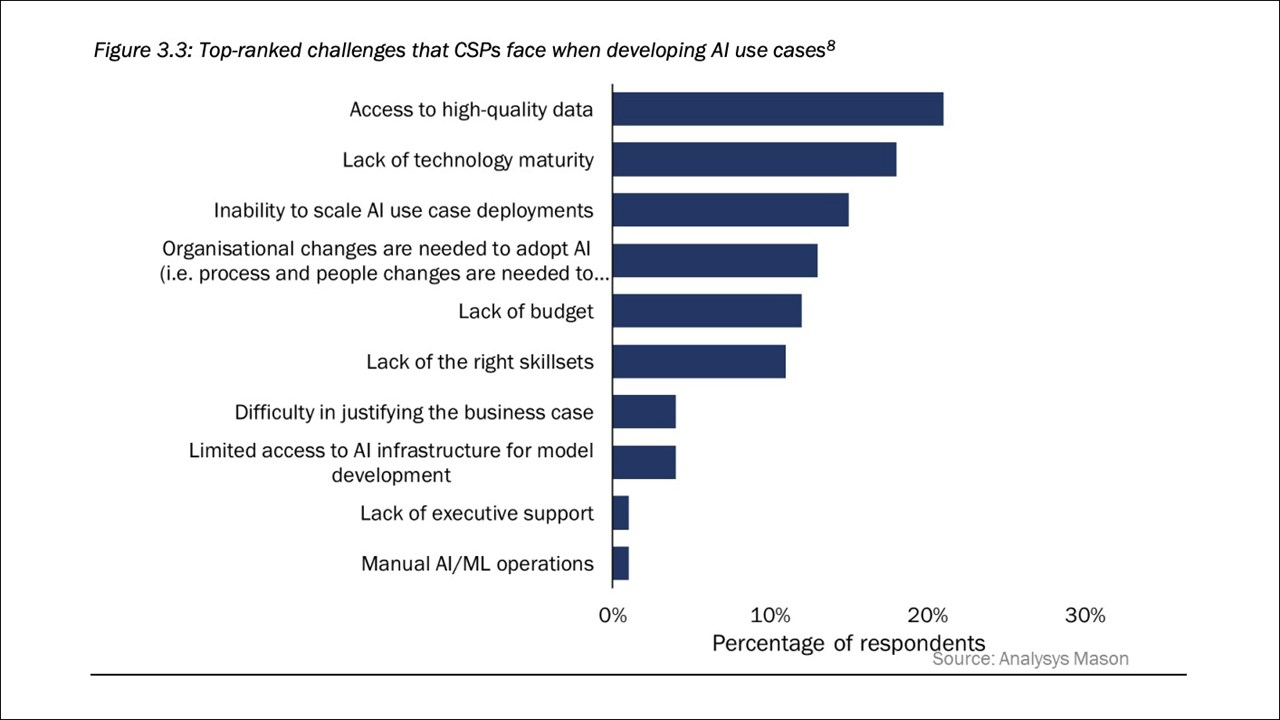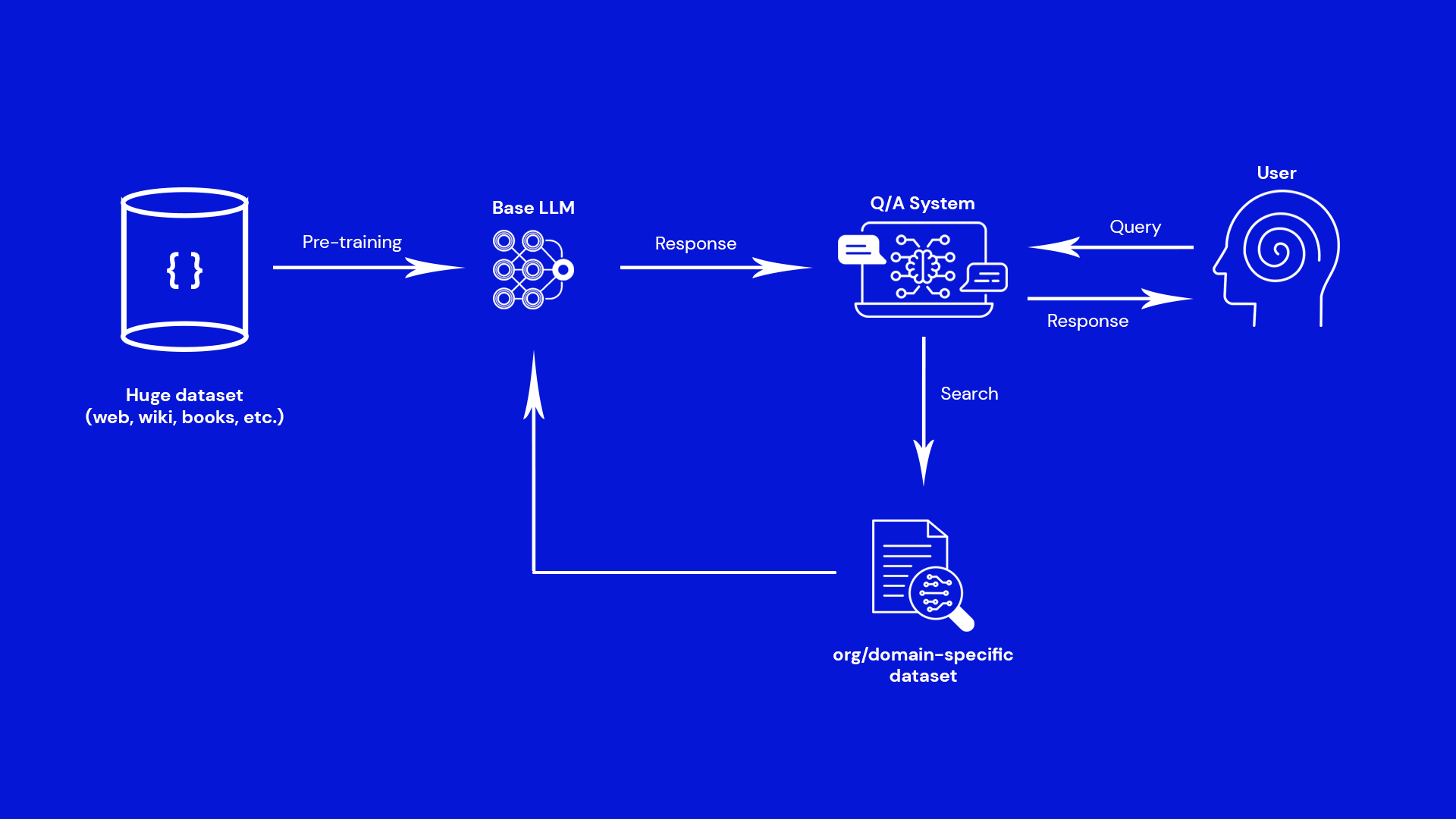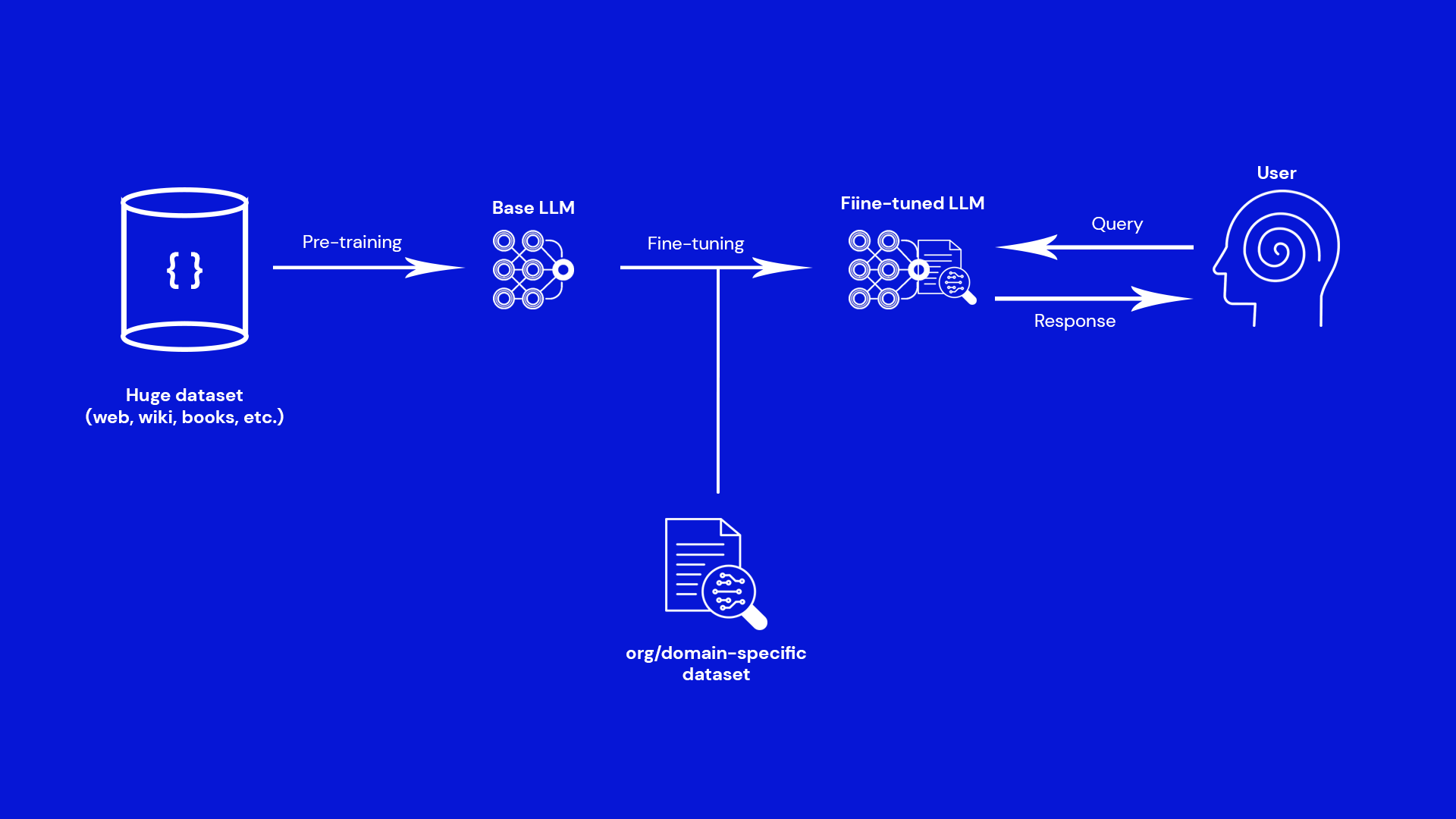Unlocking AI Success in Telco: The Crucial Role of Quality Data
AI is reshaping industries, and the Telco sector is no exception. In fact, the potential impact of AI in Telco is much more significant than in any other industry, given that Telcos provide the backbone for all other industries to innovate and transform. Successful AI adoption in Telcos will not just have a direct impact on the industry itself, it also has the power to have an indirect but exponential impact on the overall industrial ecosystem. This is why it is imperative that telecommunications adopt AI.
The key to successful AI projects is quality data in just the right quantity. This article explores the Telco AI revolution, the importance of data quality, and the expertise required in data management.
Gaurav Dixit
Stephen Hateley
Reading time: 8 minutes
Introduction: Is the Industry AI-Ready?
Artificial Intelligence (AI) is a technological compulsion that has been reshaping and revolutionizing industries, and the telecommunications (Telco) industry is following suit. AI’s ability to augment human capabilities and, in some cases, replace them, is causing a huge boost of interest. Predictive AI adoption has been going on for some time in Telco. Network planning, design, roll out, operations, predictive maintenance, customer support, marketing, pricing, and all spheres of Telco functions have been positively impacted by adoption of Predictive AI. Being an early adopter, the industry is also aggressively experimenting with Generative AI capabilities to increase efficiency, generate new revenue channels, and enhance customer experience.
The Telco industry stands as one of the most prolific in generating staggering volumes of data. This data spans consumer-related information, network-related data, and operational data. It produces structured and unstructured data and all sorts of data modality possible – text, audio, visual, etc. Both in terms of quantity and variety, the Telco sector ranks prominently.
It is critical to ensure that the industry can harness this data for AI adoption. The availability of high-quality, granular, AI-ready data is the most crucial requirement in making both predictive and generative AI yield the envisaged results.
The AI Revolution in Telco
It’s no longer about connecting calls or sending SMS/MMS messages; it’s about optimizing network performance, applying predictive maintenance, enabling smart factories and Mobility-as-a-Service (MaaS) platforms, among others. For instance, AI-driven network optimization can dynamically allocate resources, reducing congestion and ensuring a smoother experience for users and industries. AI chatbots provide instant customer support, and predictive analytics can detect and mitigate issues before they impact customers.
As telecommunications companies grapple with the complexities of evolving networks, intent-based automation fueled by AI emerges as a beacon, guiding the industry toward efficient, adaptive, and responsive operations.
Beyond the immediate benefits, AI presents an opportunity for Telcos to harness the power of data-driven insights. The industry generates vast volumes of data daily, and AI provides the means to extract actionable intelligence from this wealth of information.
The competitive landscape demands that Telcos not merely consider AI as an option but embrace it as a strategic imperative. Early adopters stand to gain a competitive edge, not just in terms of technological prowess but in their ability to innovate, adapt swiftly to market changes, and exceed customer expectations. Moreover, the cost reduction potential through AI-driven automation positions telcos for greater operational efficiency and financial sustainability.
Recent statistics and research underscore the urgency of this adaptation. In an NVIDIA report on the State of AI In Telecom , 65% of the report’s respondents agreed that AI is important to their company’s success. 60% are expecting to be able to optimize their operations with AI, and as for reaping the benefits, 73% of them reported revenue increases since their adaptation of AI.
The Data Dilemma
To comprehend the importance of quality data, it’s crucial to understand the concept of data quality itself. Data quality refers to the accuracy, completeness, consistency, and reliability of data. In the Telco industry, data comes in various forms, including call records, network performance data, customer profiles, and more. Common data quality challenges in Telecom stem from the volume of data generated, its velocity (speed of data transmission), variety (different data sources and formats), and veracity (trustworthiness of data).
In a 2023 report conducted by Analysys Mason (commissioned by Nokia), it identified access to high-quality data as the main impediment to Telco AI use case developments.

The importance of maintaining high-quality data also extends to the smooth integration with existing infrastructures, legal compliance, and latency management.
Legacy Systems Integration
Ensuring high data quality is essential when integrating new systems with legacy infrastructure. Accurate and reliable data facilitates a seamless transition, allowing new technologies to effectively communicate with existing systems. This ensures that data from legacy systems remains relevant and useful.
Legal Compliance
Meeting legality requirements demands accurate and secure data management. Telco companies need to maintain precise records for regulatory reporting, ensuring that they adhere to legal standards, data protection laws, and industry regulations.
Latency Management
Low-latency requirements in telecommunications necessitate real-time processing of high-quality data. Data must be accurate and up-to-date to support low-latency services such as real-time communication and data transmission. Poor data quality can result in delays and disruptions, compromising the reliability and effectiveness of Telco services.
The Role of Quality Data in Telco AI
When data quality is compromised, it can wreak havoc on AI projects.
For instance, if network performance data is inaccurate, AI algorithms cannot optimize resources effectively, leading to network inefficiencies. Inaccurate customer profiles can result in misguided marketing efforts and poor customer experiences.
Enough has been said about the Predictive AI-enabled applications (both supervised and unsupervised) that garbage data in for training/inference leads to garbage predictions out. This is equally, if not more relevant, for Generative AI (Large Language Models – LLMs) powered applications.
LLM tends to hallucinate. In the world of LLMs, the term “hallucination” refers to the tendency of the models to produce text that appears to be correct but is actually false or not based on the input given. For example, if you were to ask a language model a question about a historical event that never occurred, it could still generate a plausible response, even though it was entirely invented. These made-up responses from LLM are called hallucinations, meaning they generate extraneous and potentially misleading content. Any compromise in the data quality used to train the LLM or augment the user queries to LLM will increase the hallucination challenge exponentially.
We will cover this in detail in the next part of the article. Key to keep in mind is that the hallucinations are the top factor in inhibiting GenAI adoption in enterprises in Telecom and other industries as they compromise the trustworthiness of the generated responses.
Owing to the data privacy and proprietary concerns, Telco will not be open to sending their internal data to externally-hosted LLMs. We are and will continue to witness a rise of private hosted versions of LLM with the right balance of model size and performance.
There are numerous techniques already existing and new ones being developed continuously to derive better output from LLMs. A key factor ensuring better adoption is to make it as easy as possible to use while providing a superior user experience. If we lay special demands on the application users, such as the need for upskilling in prompt engineering, we are setting an entry barrier to adoption. This will limit the true democratization of GenAI adoption in the company.
Keeping this in mind, amongst the various techniques (or rather a mix of technique and art) way to query these LLMs, RAG (Retrieval Augmented Generation) has emerged as the one which seems to fit the needs of enterprises. RAG augments the queries with the internal knowledge sources, and then sends the ‘augmented’ query to privately-hosted LLM(s).

The LLM leverages the enhanced context provided by the internal knowledge sources to retrieve high-quality responses from the massive data set it has been trained on. The quality of the retrieval from the internal knowledge sources decides the quality of the LLM output. The former is highly dependent on the data quality of the internal Telco data. So the single most important factor that impacts the quality of the generations from LLMs, and hence their adoption, is the data quality used to train, fine tune, and query them.
Another method suitable for industry verticals like Telcos is that of fine–tuning the LLMs on internal data. This makes the LLM customized for the specific data set(s) it is fine–tuned on. The relevance of the internal data being high-quality is if not more than equally important in this case as well to ensure high-quality generations from the fine–tuned LLMs.

Data Collection Expertise in Telco: Why DigitalRoute Is a Go-To Vendor
DigitalRoute excels in collecting data from a multitude of sources and formats, processing, and enriching this data to produce the end product: high-quality, descriptive data. Our expertise lies in collecting vast and diverse datasets and refining them to meet the stringent requirements in various use cases in the Business Support Systems (BSS), Operational Support Systems (OSS), and Policy domains.
DigitalRoute’s history in this space spans over 20 years, during which the company has consistently demonstrated its capability in data collection, mediation, and management for Telco companies. We have been instrumental in transforming raw data, including that from OSS and BSS, into refined and actionable data, enhancing the efficiency and decision-making capabilities of Telco operations.
We have demonstrated our solutions’ capabilities in the largest and most complex of Telecom environments. For example, we have processed up to 660k transactions per second (TPS) of charging requests with one client. With another client, we processed 10 million OSS data-related records per second in real-time. We supported over 1 million TPS related from to both radio and core network. In all of these cases, the format varies from XML, binary, and ASN.1, among others. Sources also vary a lot, from direct integration to network nodes, probes to centralized Element Management system, and both in real-time (streaming) and batch.
Conclusion
AI is reshaping the Telco industry profoundly, from Predictive AI adoption to exploring Generative AI capabilities, expanding beyond traditional services. The success of AI in Telco depends on data quality amid challenges like legacy systems integration, legal compliance, and latency management. High-quality data is crucial to avert network inefficiencies and misguided marketing.
The rise of Generative AI, especially Large Language Models (LLMs), brings data quality challenges, emphasizing the need to mitigate hallucinations for reliable responses. In this AI transformation, DigitalRoute stands out as a trusted vendor, with a two-decade track record in collecting, processing, and refining diverse datasets for Telco operations.
Simplify Your Network Operations through an Advanced Data Platform and GenAI.
Join us as we explore a practical AI use case revolutionizing Telco’s network operations. Collaborating with Snowflake and AWS, our experts will showcase how an advanced data platform, alongside GenAI, simplifies and transforms network operations.
Challenges of Billing Optimization in a Usage-Based Model
Enterprises with usage or consumption-based business models face significant challenges when it...
Discover Usage Engine Private Edition 4: Agility in the Cloud
DigitalRoute software has been deployed by hundreds of companies across industries over the last...
Solving Billing Challenges from Start to Finish
In this blog post, we touch on the... err... touchpoints of billing and monetization, revealing...







